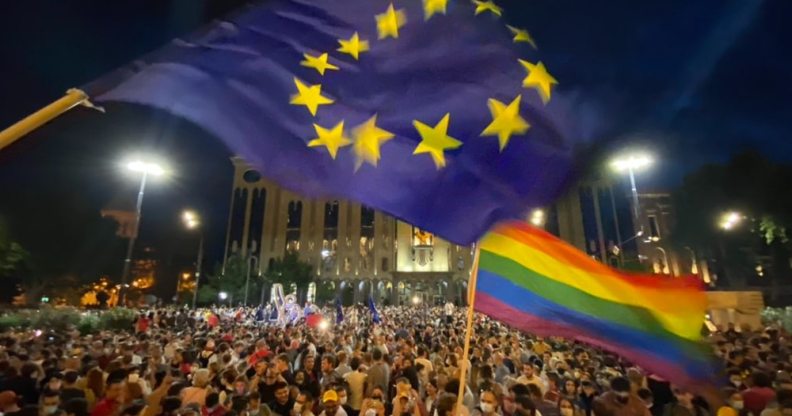Thousands protest in Georgia after terrifying, far-right violence cancelled Tbilisi Pride

In a ‘historic’ moment, thousands of LGBT+ people and their allies protested against hate in Tbilisi. (Twitter/@Tabagari)
Thousands protested in front of the parliament building in Tbilisi, Georgia, on Tuesday evening (6 July) after the capital’s Pride was cancelled amid far-right attacks.
Tbilisi Pride organisers were forced to cancel week-long Pride festivities after their officers were stormed by violent right-wing thugs, seizing the city with unrest and leaving LGBT+ Georgians terrified.
The violence was denounced by the embassies of more than 15 countries as well as top human rights groups – but the Georgian government instead blamed LGBT+ people.
But in a moment dubbed “historic” by Pride organisers, thousands of Georgians packed Rustaveli Avenue outside parliament in solidarity with Tbilisi Pride with a clear message: There’s no place for hate in Georgia.
“This anthem, flag and country itself belong to us, too!” tweeted Giorgia Tabagari, Tbilisi Pride’s director and a civic activist. “And we are not gonna give up on any of it!”
🏳🌈Truly historic moment for #Georgia's queer movement. Right in front of Parliament.
❗This anthem, flag and country itself belong to us too! and we are not gonna give up on any of it!
✊#TbilisiPride21 is now over and can't express how happy I am now. We made it! pic.twitter.com/SLroxA1Q4A
— Giorgi Tabagari (@Tabagari) July 6, 2021
We didn't manage to march yesterday as planned, but we brought #Pride spirit in front of the parliament today!
Violence won't prevail #Georgia! #TbilisiPride21 #TbilisiPride2021 pic.twitter.com/LJ53zUj5DV— Giorgi Tabagari (@Tabagari) July 6, 2021
Historic picture. Us in front of the Parliament of Georgia with 7,000 people ✊ pic.twitter.com/0P1eMhJmiB— Tbilisi Pride (@TbilisiPride) July 6, 2021
While the group’s planned parade was cancelled, Tbilisi locals more than made up for it.
Thousands show up to support Tbilisi Pride, shadowing pitiful far-right counter-protest
Waving European Union and rainbow flags, demonstrators gathered to lock arms and denounce the wave of far-right violence. Police protected the LGBT+ protesters by cordoning off the area.
They cheered, whistled and set off rainbow gas canisters in a kaleidoscopic display that easily shadowed the 200-strong counter-protest nearby organised by anti-LGBT+ activists, the Daily Times reported.
Being LGBT+ has long been taboo in Georgia, where the powerful and tightly traditional Orthodox Church carries immense sway in public opinion. It had only last month denounced Tbilisi Pride as a “grave sin”.
As much as the government has, at times, tepidly rolled out legislation to better protect LGBT+ folk, queer Georgians remain walking targets for abuse and violence.
Such tensions reached a flashpoint Monday when far-right religious groups stormed the Tbilisi Pride office, where alarming video and photographs showed them scaling the three-storey building.
After breaking in, they ransacked the place and tore down a Pride poster. Some assaulted civilians, tourists and journalists with stones.
The protest came to an explosive head when the far-right demonstrators, overwhelmingly white and male, scuffled with members of the press. At least 50 journalists sustained injuries, with one being battered with sticks and others nearly being mowed down by a scooter.
⚠️ sensitive content ⚠️#FormulaTV journalist Rati #Tsverava was violently beaten by dozens of anti-#TbilisiPride21 protesters
More than 20 #media representatives were physically assaulted by aggressive mobs. No one has been arrested pic.twitter.com/Ne0Fh5cygr— Formula NEWS | English (@FormulaGe) July 5, 2021
In the hours that followed, government officials resorted to finger-pointing. Prime minister Irakli Garibashvili blamed the unrest on the LGBT+ community, saying that being queer is “unacceptable for a large segment of the Georgian society” in a cabinet meeting.
After Tbilisi Pride moved to cancel its events, the group took aim squarely at the government. Members claimed that the police – which is run by the Ministry of Internal Affairs of Georgia – did not even attempt to fend off the confronters.
They said the law enforcement agency’s inaction and the government’s backing has stirred a “wave of hate”.
Tbilisi Pride’s history has been one of fits-and-bursts that captures the injustices queer citizens face in the deeply conservative country.
In 2019, when the group sought to stage its first Pride march, it had to be cancelled when an anti-gay millionaire urged homophobes to bring wooden clubs.

